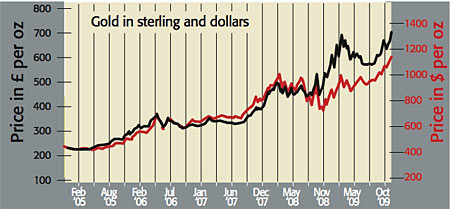Get the latest financial news, insights and expert analysis from our award-winning MoneyWeek team, to help you understand what really matters when it comes to your finances.
You are now subscribed
Your newsletter sign-up was successful
Want to add more newsletters?

Twice daily
MoneyWeek
Get the latest financial news, insights and expert analysis from our award-winning MoneyWeek team, to help you understand what really matters when it comes to your finances.

Four times a week
Look After My Bills
Sign up to our free money-saving newsletter, filled with the latest news and expert advice to help you find the best tips and deals for managing your bills. Start saving today!
History suggests that the rally is set to continue, according to Goldman Sachs. Its study of European markets (going back to 1974) shows that the average market performance in both December and January has been positive 70% of the time. The first and fourth quarters are typically strongest, supporting the 'sell in May' rule.
What's more, strong January to November performances point to a strong December. When the market has gained more than 20% in the first 11 months as in 2009 the average December return has been 3.6%. But don't take these seasonal patterns too seriously. Another one widely highlighted is the January effect, evident in the S&P 500 between 1940 and 2003 the first month sets the tone for the rest of the year, says Tom Stevenson in The Sunday Telegraph. That fell "flat on its face" this year the S&P tanked in January but has since rocketed.
Meanwhile, Goldman notes that the December/January strength pattern has been "almost non-existent" over the last decade. Selling in May and going away didn't work in 2009 either.
MoneyWeek
Subscribe to MoneyWeek today and get your first six magazine issues absolutely FREE

Sign up to Money Morning
Don't miss the latest investment and personal finances news, market analysis, plus money-saving tips with our free twice-daily newsletter
Don't miss the latest investment and personal finances news, market analysis, plus money-saving tips with our free twice-daily newsletter
The big picture: gold is the safest currency of all

Gold has now hit a new record in both dollar and sterling terms. It passed $1,170 and £700 an ounce respectively, thanks to the Russian central bank stocking up on gold to diversify its reserves.
So the bull run looks far from over. Investors and emerging-market central banks have become increasingly keen on gold, the oldest currency and ultimate store of value. Money printing by Western banks, desperate to stave off deflation, threatens to devalue their currencies and fuel inflation.
Gold, however, can't simply be reproduced at the touch of a button. It won't trade below $1,000 ever again, reckons analyst Marc Faber.
Get the latest financial news, insights and expert analysis from our award-winning MoneyWeek team, to help you understand what really matters when it comes to your finances.
MoneyWeek is written by a team of experienced and award-winning journalists, plus expert columnists. As well as daily digital news and features, MoneyWeek also publishes a weekly magazine, covering investing and personal finance. From share tips, pensions, gold to practical investment tips - we provide a round-up to help you make money and keep it.
-
 Average UK house price reaches £300,000 for first time, Halifax says
Average UK house price reaches £300,000 for first time, Halifax saysWhile the average house price has topped £300k, regional disparities still remain, Halifax finds.
-
 Barings Emerging Europe trust bounces back from Russia woes
Barings Emerging Europe trust bounces back from Russia woesBarings Emerging Europe trust has added the Middle East and Africa to its mandate, delivering a strong recovery, says Max King

